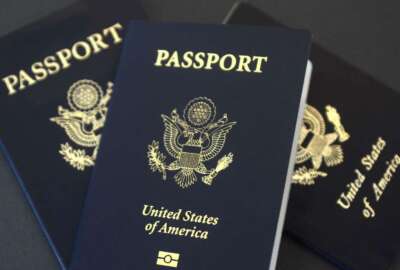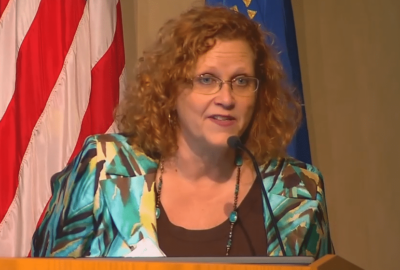Senator hopes to speed up passport process before summer ends
In today's Federal Newscast, one Senator says he’s working on legislation that would give the State Department more ways to handle its backlog of passport app...
- The National Institutes of Health (NIH) is having trouble recruiting data science experts. But before NIH tries to bring more qualified candidates on board, it needs to figure out the skills it already has in its current workforce. A new report from the Government Accountability Office says by making those determinations, NIH will be able to figure out the exact skills it needs to hire for. Until it can address its data science skills gap, GAO says NIH risks being able to effectively administer tens of billions of dollars in annual research grants.(NIH needs to implement key workforce planning activities - Government Accountability Office)
- Another agency has made plans to increase in-office work for its staff. Employees at the Agency for International Development (USAID) will soon have to be in the office three days per week. Agency leaders are planning to make the change in a phased approach and fully implement the office re-entry by late September. USAID is one of several agencies that have recently announced plans to return feds to the office more often, after the Office of Management and Budget called on agencies to increase meaningful in-office work as part of post-pandemic plans.(The ‘new-new’ normal? More agencies bumping up in-office work - Federal News Network)
- The Coast Guard will allow nursing mothers facilities and privacy to pump breastmilk according to new guidance. The directive says a clean, private space should be provided with access to cold storage and water for cleaning equipment. The rule includes shipboard environments. Women must be given the time away from their duties to express milk. The new guidance comes as a result of the Providing Urgent Maternal Protections for Nursing Mothers Act, known as "PUMP," that was passed by Congress as part of fiscal 2023 appropriations. The Defense Department's service branches have similar programs in place.(Update to pregnancy in the Coast Guard - U.S. Coast Guard)
- A former mail carrier’s religious discrimination case against the Postal Service doesn’t end at the Supreme Court. The Supreme Court is clarifying the standard for employers to reject religious accommodations in the workplace. The court in a unanimous opinion says employers must honor those religious accommodations unless they would result in “substantial increased costs.” But the specifics of a case brought by a former rural letter carrier will get another day in court. The former carrier claims USPS didn’t accommodate his request to not work Sundays. The Supreme Court is sending the case back to the Third Circuit of the U.S. Court of Appeals, to rehear the case based on its new standard. The appeals court previously ruled in favor of USPS.
- Small Business Administration Administrator Isabella Guzman will be in the hot seat on July 13 trying to explain to House lawmakers the drastic differences between two separate pandemic fraud estimates. House Small Business Committee lawmakers called the hearing after the SBA IG found the agency's pandemic loan programs suffered from more than $200 billion in fraud. This is in stark contrast to the agency's own analysis that estimated only about $36 billion in fraud. Lawmakers say the drastic discrepancies are made worse by what they say is a lack of an adequate plan to recoup these stolen taxpayer funds.(House Small Business Committee hearing on SBA fraud in pandemic lending - House Small Business Committee)
- The State Department is dealing with a backlog in passport applications at the height of the summer travel season. Senator James Lankford (R-Okla.) says he’s working on legislation that would give the department more ways to handle its caseload. Lankford says his upcoming bill would require the department to develop a reserve workforce it can reassign to support Passport Services during periods of high demand. The bill would also require the National Passport Information Center to launch new customer support tools for individuals waiting on a passport. The bill would prevent Passport Services employees from teleworking if the department exceeds an average of 12 weeks to issue passports. (Lankford takes action to fix historic passport backlog - Sen. James Lankford (R-Okla.))
- The Government Accountability Office yesterday upheld 98 protests from companies who were eliminated in Phase 1 of the competition to win a spot on CIO-SP4. GAO found the National Institutes of Health’s IT Acquisition and Assessment Center (NITAAC) fell short in two areas when evaluating bids for the $50 billion IT services governmentwide acquisition contract. First, GAO says NITAAC’s record doesn’t show it reasonably evaluated the phase 1 offers. Second, GAO says NITAAC didn’t reasonably determine which proposals would advance to the next stages of competition. GAO recommended NITAAC reevaluate proposals and make new determinations of which proposals advance past phase 1.(GAO upholds 98 protests of CIO-SP4 - Federal News Network)
- The Space Force needs to strengthen its capabilities before it can defend itself against counterspace attacks. That's according to a new report from the Mitchell Institute, which found the emerging threat from foreign adversaries makes the U.S. vulnerable to having its space capabilities disarmed or disabled. The report says the service doesn't have the resources or the technology to protect satellites, communication and command and control in space. Space Force leaders say they need a new training model and faster adoption of new technology to counter the threat.(Space Force not ready to face counterspace threat - Federal News Network)
- The Government Accountability Office calls out challenges with the new national cyber strategy. GAO says the Biden administration needs to identify the specific resources and investments behind its national cyber strategy, just issued in March. GAO in a report says the White House Office of the National Cyber Director needs to quickly finalize an implementation plan that identifies specific agency goals and priorities. And GAO also calls out the vacant national cyber director role. Kemba Walden has served as acting national cyber director since February, and several lawmakers have called on President Joe Biden to name her as nominee for the permanent position. (Cybersecurity: Launching and Implementing the National Cybersecurity Strategy - Government Accountability Office)
- The Cybersecurity and Infrastructure Security Agency is trying to convince more critical infrastructure organizations to let the agency help monitor their networks for cyber threats. In a notice published this week, CISA pitched organizations on its “CyberSentry”program.’ It provides voluntary participants with sensing and monitoring tools for both information technology and operational technology networks. CISA says it’s specifically looking to partner with companies and organizations that provide so-called “national critical functions.”(CyberSentry Program Launches Webpage - Cybersecurity and Infrastructure Security Agency)
Copyright © 2024 Federal News Network. All rights reserved. This website is not intended for users located within the European Economic Area.
Eric White
Eric White is news anchor and Federal Drive producer at Federal News Network.
Follow @FEDERALNEWSCAST






